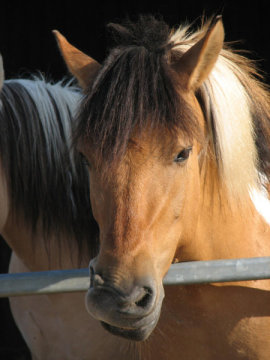[ad_1]
New evidence that horses reliably produce more snorts in favorable situations could improve animal welfare practices, according to a study published July 11 in the open-access journal PLOS ONE by Mathilde Stomp of the Université de Rennes, France, and colleagues.
Assessing positive emotions is important for improving animal welfare, but it has been challenging to identify reliable indicators. Physiological markers often give contradictory results, and many behavioural signals are ambiguous. In particular, few studies have examined acoustic indicators of positive emotions.
Anecdotal reports have indicated that horses frequently produce snorts in positive situations. Following up on this evidence, Stomp and colleagues evaluated snort production by 48 horses that lived either in restricted conditions (i.e., riding school horses that spent much of their time in individual stalls) or naturalistic conditions (i.e., stable groups of horses always in pasture).
Snort production was significantly associated with positive situations and with a positive internal state, as indicated by ears positioned forward or sideways. For example, riding school horses produced twice as many snorts in pasture than when they were in stalls. In addition, horses living in naturalistic conditions emitted significantly more snorts than riding school horses in comparable contexts. Taken together, the findings suggest that snorts are reliable indicators of positive emotions in horses.
Dr Stomp notes: “The snort, a non-vocal signal produced by the air expiration through the nostrils, is associated with more positive contexts (in pasture, while feeding) and states (with ears on forward position) in horses. Moreover, it is less frequent in horses showing an altered welfare. These results provide a potential important tool as snorts appear as a possible reliable indicator of positive emotions which could help identify situations appreciated by horses.”
Story Source:
Materials provided by PLOS. Note: Content may be edited for style and length.
[ad_2]















